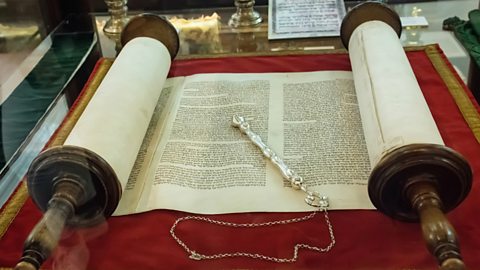Key principles вҖ“ mitzvot
There are 613 mitzvotCommandments or laws in Judaism., which are Jewish rules or commandments. They cover many aspects of Jewish life, some in great detail. Jews agreed to follow these rules when they were given to MosesThe man chosen by God to save the Jews from slavery and take them to the promised land. In the Qur'an he is a messenger chosen by God to give the revelation of the Torah to the Israelites. as part of the covenantAn agreement or promise. at Mount SinaiA mountain in the Sinai desert, believed to be where Moses received the Ten Commandments.. Following these laws is a core part of Jewish identity. The 613 mitzvot can be found in the TorahLaw; teaching. The word Torah can be used in a narrow sense to mean the first five books of the Hebrew Bible (The Five Books of Moses) and also in a wider sense to include the whole of the Hebrew Bible and the Talmud. and they guide Jews on how to live a good life. Many Jews believe that disobeying the mitzvot will result in punishment.

Types of mitzvot
One way of thinking of the mitzvot is as вҖҳpositiveвҖҷ and вҖҳnegativeвҖҷ rules:
- There are 248 positive mitzvot, which explain what Jews should do. These rules are known as mitzvot aseh.
- There are 365 negative mitzvot, which explain what Jews should not do. These rules are known as mitzvot lo taaseh.
Constant mitzvot
There are also six constant mitzvot. These are rules or laws that should always be in the minds of Jews:
- Know there is a God.
- Do not believe in other gods.
- Know that God is one.
- Love God.
- Fear God.
- Do not be misled by your desires - although it might be hard at times to obey all of GodвҖҷs commands, stay focused.
Chukim and mishpatim
Mitzvot may also be categorised as:
- chukim - mitzvot that humans cannot understand, for example many of the kashrutIn Judaism, the laws relating to keeping a kosher (fit or proper) home. food laws
- mishpatim - mitzvot that humans can understand, for example mitzvot from the Ten CommandmentsThe list of rules, revealed by God to Moses, found in the Old Testament books of Exodus and Deuteronomy. Also known as the Decalogue. such as вҖҳdo not commit murderвҖҷ
Reform JewsJews who have adapted their laws and practices as modern life has changed. may prioritise keeping the mishpatim mitzvot over the chukim mitzvot. Orthodox JewsJews who live by the Torah and rabbinic law (halakhah) and who only accept changes that can be supported by the Torah. are likely to see the chukim mitzvot as equally important to the mishpatim mitzvot. For them, God gave the commandment so it should be followed.
Question
Why do Jews believe it is important to follow the mitzvot?
Jews believe that Moses received the mitzvot from God. Therefore, following the mitzvot will help them to live a good life as God would want.